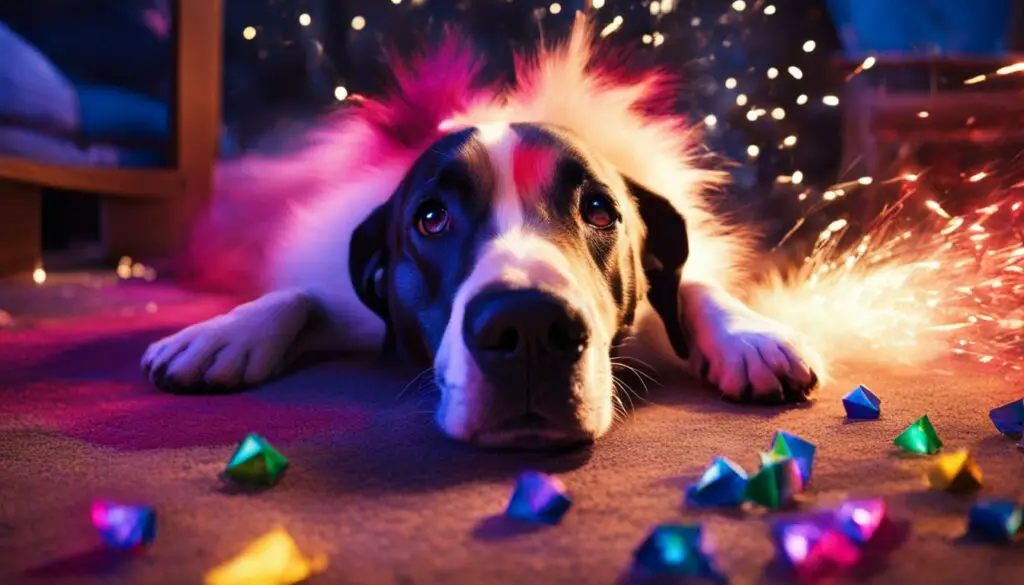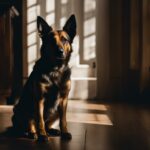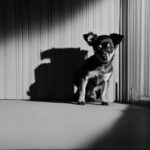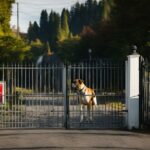Fireworks can be a source of anxiety for dogs, causing them to tremble, shake, and bark. As a dog owner, it’s important to know how to calm your furry friend during fireworks to ensure their comfort and safety. In this article, I will share expert tips and techniques to help soothe your dog during fireworks celebrations.
During fireworks displays, dogs may experience noise aversion and stress. The loud bangs and flashes of lights can startle and scare them. Understanding why dogs are afraid of fireworks is essential in addressing their anxiety effectively. By recognizing the signs of fear in your dog, you can take appropriate measures to create a peaceful environment for them. Additionally, it’s important to know how fireworks can potentially impact your dog’s ears and take steps to protect their hearing.
In this article, I will guide you through steps to calm your dog during fireworks, provide long-term solutions for helping your dog with firework anxiety, and offer tips on preparing your dog for fireworks events. I will also share techniques to respond to your dog’s anxiety during fireworks and the importance of continued support after the fireworks are over.
If your dog’s anxiety is severe, seeking professional help from veterinarians or trainers may be necessary. Remember, every dog is unique, so it’s crucial to be patient and find the techniques that work best for your furry friend.
By implementing these expert tips and techniques, you can create a safe and comforting environment for your dog during fireworks, ensuring their well-being and happiness.
Key Takeaways:
- Fireworks can cause anxiety in dogs, leading to trembling, shaking, and barking.
- Understanding why dogs are afraid of fireworks helps in addressing their anxiety effectively.
- Recognize signs of fear in your dog to create a peaceful environment for them.
- Take steps to protect your dog’s ears from the impact of fireworks.
- Follow expert tips to calm your dog during fireworks, including creating a safe haven and playing white noise.
Understanding Why Dogs Are Afraid of Fireworks
Fireworks can be a beautiful spectacle for humans, but for many dogs, they can be a source of fear and anxiety. Understanding why dogs are afraid of fireworks is essential in helping them cope with this stressful situation. There are several factors that contribute to dogs’ fear of fireworks:
- Loud noises: The loud bangs and booms of fireworks can be overwhelming for dogs, whose hearing is far more sensitive than ours. The sudden and unpredictable noise can startle them and trigger their fear response.
- Flashes of light: The bright, colorful flashes of fireworks can be disorienting and alarming to dogs, especially if they are not accustomed to this type of visual stimulation.
- Unpredictability: Dogs thrive on routine and predictability, and the sporadic nature of fireworks can be distressing to them. They are unable to anticipate when the next firework will explode, which adds to their anxiety.
- Sensory overload: In addition to the loud noises and flashes of light, the smell of fireworks can also contribute to dogs’ fear. The combination of these sensory stimuli can be overwhelming and make them feel unsafe.
It’s important to remember that every dog is unique and may have different triggers for their fear of fireworks. Some dogs may have had a negative experience in the past, while others may be more sensitive to noise or visual stimuli. By understanding the reasons behind dogs’ fear of fireworks, we can better empathize with their anxiety and take appropriate measures to help them feel safe and calm during fireworks displays.
“The loud bangs and booms of fireworks can be overwhelming for dogs, whose hearing is far more sensitive than ours. The sudden and unpredictable noise can startle them and trigger their fear response.”
Dogs’ Fear of Fireworks: The Impact
The fear and anxiety that dogs experience during fireworks can have a significant impact on their well-being. Dogs may exhibit a range of behaviors when they are afraid, including trembling, shaking, panting, pacing, hiding, or seeking extra attention. Some dogs may even try to escape or become aggressive in their fear response. It’s important to recognize these signs of fear in our dogs and respond appropriately to help alleviate their distress.
In addition to the immediate effects, repeated exposure to fireworks can also have long-term consequences for dogs. It can reinforce their fear and make it more difficult for them to overcome their anxiety in the future. This is why it is crucial to address their fear of fireworks and provide them with the support they need to feel safe and secure.
The Impact of Fireworks on Dogs: A Visual Representation
| Impact of Fireworks on Dogs | Effects on Dogs |
|---|---|
| Loud Noises | Trigger fear response, trembling, shaking, panting |
| Flashes of Light | Disorientation, fear, visual distress |
| Unpredictability | Increased anxiety, heightened stress levels |
| Sensory Overload | Overwhelming stimuli, feeling unsafe |
By understanding the impact of fireworks on dogs, we can take proactive steps to help alleviate their fear and provide them with the support they need during this challenging time.
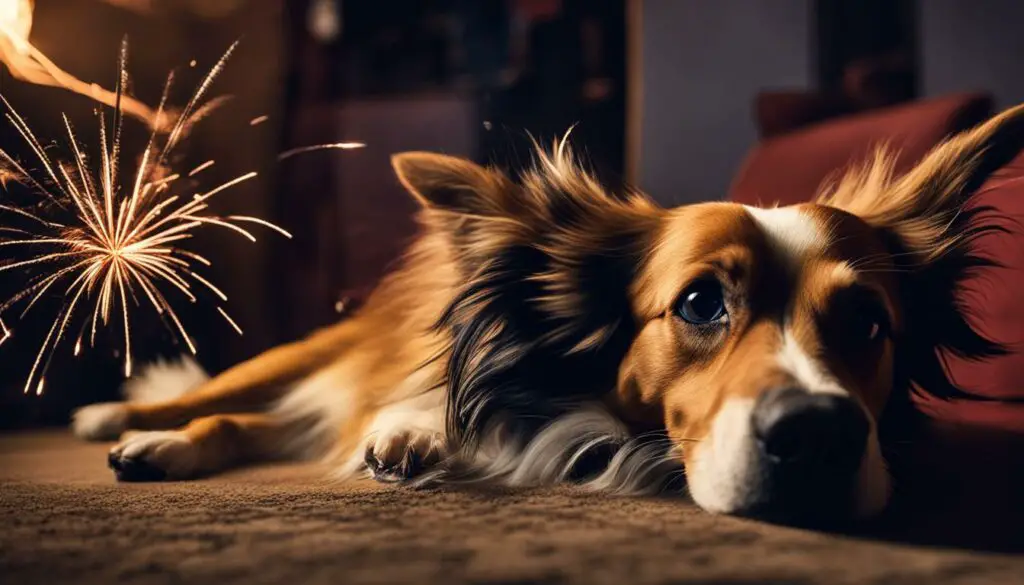
Recognizing Signs of Fear in Your Dog
Dogs, like humans, can experience fear and anxiety in certain situations. When it comes to fireworks, many dogs exhibit signs of fear due to the loud noises and bright lights associated with these events. It’s important for dog owners to recognize these signs of fear so that they can take appropriate measures to help their furry friends feel safe and calm.
Here are some common physical cues that may indicate fear in dogs:
- Pinned back ears
- Growling or whining
- Shaking or trembling
- Raised fur
- Running away or seeking extra attention
- Excessive panting, pacing, or drooling
- Shallow breathing
By observing these physical cues, dog owners can better understand when their pets are feeling anxious or fearful. This awareness allows them to intervene and provide the necessary support to help their dogs feel more secure during fireworks celebrations.
Table: Signs of Fear in Dogs
| Physical Cues of Fear | Description |
|---|---|
| Pinned back ears | Ears pressed tightly against the head |
| Growling or whining | Low, guttural noises or high-pitched vocalizations |
| Shaking or trembling | Involuntary movements of the body |
| Raised fur | Hairs on the back or neck standing on end |
| Running away or seeking extra attention | Attempts to escape or cling to their owner |
| Excessive panting, pacing, or drooling | Visible signs of stress and anxiety |
| Shallow breathing | Rapid or irregular breaths |
Recognizing these signs of fear in dogs is crucial for providing the necessary support and comfort. By addressing their anxiety, dog owners can create a safe environment and help their pets feel more at ease during fireworks displays.
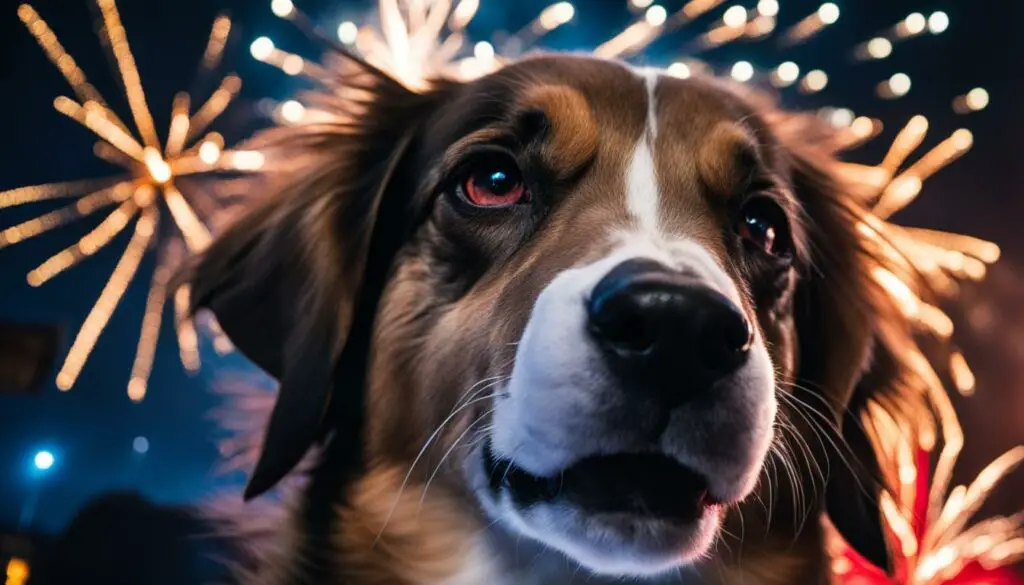
The Potential Impact of Fireworks on Dogs’ Ears
Fireworks can have a significant impact on dogs’ ears, causing discomfort and distress. Dogs have much more sensitive hearing than humans, which means the loud noises from fireworks can be overwhelming for them. While the primary effect of fireworks on dogs is psychological and emotional, it’s important to take steps to protect their delicate ears during fireworks displays.
The loud bangs, whistles, and pops of fireworks can reach high decibel levels that can potentially damage a dog’s hearing. Dogs‘ ears are designed to pick up a wider range of frequencies, and they can hear sounds at much greater distances than humans can. What may sound like a distant explosion to us can be much louder and more immediate to a dog. This sudden and intense noise can cause fear and anxiety in dogs, leading to behavioral changes and even long-term negative effects on their well-being.
To protect your dog’s ears during fireworks, consider using ear protection specifically designed for dogs. There are various options available, such as earmuffs or earplugs that can help muffle the sound and reduce the impact on their sensitive ears. It’s important to choose ear protection that fits properly and does not cause discomfort for your dog. Consulting with a veterinarian can help you determine the best option for your individual dog’s needs.
Additionally, creating a calm and safe environment for your dog can also help minimize the impact of fireworks on their ears. Providing a quiet space indoors with soft bedding and familiar toys can give your dog a sense of security during the noise and commotion outside. Playing soothing music or white noise can also help mask the sounds of fireworks and provide a more relaxing atmosphere for your dog. By taking these proactive measures, you can help protect your dog’s ears and reduce their overall stress and anxiety during fireworks displays.
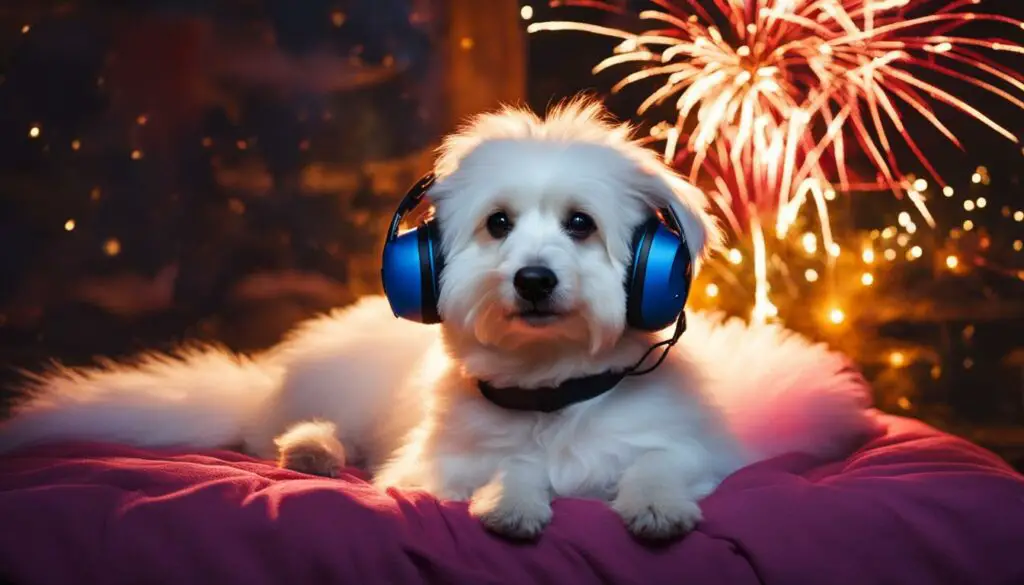
Steps to Calm Your Dog During Fireworks
When it comes to helping your dog stay calm during fireworks, there are several effective techniques you can employ. By following these tips, you can create a peaceful environment for your furry friend and minimize their anxiety.
Create a Safe Haven
One of the first steps is to create a safe haven for your dog. This can be a designated area in your home where your dog feels secure and comfortable. Consider using a basement, closet, or a quiet room away from windows. Make this space inviting by adding familiar bedding, toys, and treats. By providing a secure area, your dog will have a place to retreat to when they feel frightened by the fireworks.
Play Soothing Sounds
Another effective technique is to play white noise or soothing music to help mask the sounds of the fireworks. This can help drown out the loud bangs and pops that may startle your dog. Choose calming music or nature sounds that your dog enjoys and play it at a volume that is soothing to them. The continuous background noise can help your dog relax and feel less anxious.
Desensitize Your Dog
Desensitizing your dog to the sounds of fireworks can also be beneficial in helping them stay calm. Start by playing recordings of fireworks at a low volume and gradually increase the volume over time. While playing the sounds, engage with your dog in activities they enjoy, such as playing with their favorite toys or giving them treats. By associating positive experiences with the sounds of fireworks, you can help your dog become more tolerant and less fearful.
Comfort and Reassurance
During fireworks, it’s important to provide comfort and reassurance to your dog. Stay calm yourself and maintain a soothing demeanor. Comfort your dog by gently stroking them or sitting close by. Your presence can provide a sense of security for your dog. Remember to stay positive and avoid rewarding fearful behaviors, as this can reinforce their anxiety.
By implementing these steps, you can help calm your dog during fireworks and create a more peaceful experience for them. Remember, every dog is unique, so experiment with different techniques to find what works best for your furry friend.
| Techniques to Calm Your Dog During Fireworks | Benefits |
|---|---|
| Create a Safe Haven | Provides a secure space for your dog to retreat to during fireworks |
| Play Soothing Sounds | Masks the sounds of fireworks and helps your dog relax |
| Desensitize Your Dog | Helps your dog become more tolerant and less fearful of fireworks |
| Comfort and Reassurance | Provides your dog with a sense of security during fireworks |
By incorporating these techniques into your fireworks routine, you can help your dog feel more calm and secure during these potentially stressful events.
Long-Term Solutions for Helping Your Dog with Firework Anxiety
When it comes to helping your dog overcome firework anxiety, it’s important to focus on long-term solutions rather than just temporary fixes. One effective approach is desensitizing your dog to loud sounds, including fireworks. This involves gradually exposing your dog to recorded sounds of fireworks while providing positive associations and rewards. By pairing the sounds with something enjoyable, like treats or playtime, you can help your dog develop a more positive association with fireworks over time. This conditioning technique is best started when your dog is a puppy, but it can still be effective for older dogs as well.
Desensitization works by gradually increasing the volume of the recorded sounds, helping your dog build resilience and tolerance. It’s important to progress at a pace that is comfortable for your dog, taking breaks or going back a step if they show signs of stress or fear. Professional trainers and behavior consultants can provide guidance and support in developing a desensitization program tailored to your dog’s specific needs.
Another long-term solution is conditioning your dog to tolerate noises in general, not just fireworks. This involves exposing your dog to a wide range of everyday sounds, such as doorbells, vacuum cleaners, and thunderstorms, while rewarding them for calm behavior. By gradually increasing the intensity of the sounds and rewarding your dog for staying calm, you can help them become more resilient to various noises. This conditioning can be done through structured training sessions or incorporated into daily activities.
In addition to desensitization and conditioning, it’s important to provide ongoing support for your dog. This includes continuing to practice desensitization exercises even after your dog has shown improvement, as well as addressing any other sources of anxiety in their daily life. Creating a calm and structured environment, providing mental and physical stimulation, and ensuring consistent routines can all help reduce overall anxiety levels in your dog. Remaining patient, understanding, and supportive throughout the process is key to helping your dog overcome their firework anxiety in the long term.
| Long-Term Solutions for Helping Your Dog with Firework Anxiety | Desensitization | Conditioning to Tolerate Noises | Ongoing Support |
|---|---|---|---|
| Gradually exposing your dog to recorded sounds of fireworks | Pairing sounds with positive associations and rewards | Exposing your dog to a wide range of everyday sounds | Creating a calm and structured environment |
| Progressing at a comfortable pace for your dog | Building resilience and tolerance | Rewarding calm behavior during exposure | Providing mental and physical stimulation |
| Seeking guidance from professional trainers | Customizing a program for your dog’s needs | Incorporating conditioning into daily activities | Maintaining consistent routines |
Preparing Your Dog for Fireworks
When it comes to keeping your dog calm and safe during fireworks, preparation is key. By taking a few simple steps beforehand, you can create a safe and stress-free environment for your dog during the fireworks festivities.
Creating a Safe Environment
Start by designating a safe space for your dog to retreat to. This could be a covered crate, a quiet room, or any area in your home where your dog feels secure. Make sure this space is comfortable and familiar to your dog by including their favorite bedding and toys.
It’s also important to minimize the impact of the fireworks on your dog’s senses. Keep curtains closed to reduce the visibility of the lights from the fireworks display. This can help to create a calmer atmosphere inside your home. Additionally, playing soothing music or white noise can help mask the sounds of the fireworks, providing a more peaceful environment for your dog.
Minimizing the Noise
Distancing your dog from the noise is another effective way to help them cope with fireworks. Find a quiet room in your home where the sound of the fireworks will be less noticeable. Close windows and doors to minimize the noise coming from outside.
Providing distractions for your dog can also be helpful. Puzzle toys or long-lasting chews can keep them engaged and focused on something other than the loud noises outside. These distractions can help redirect their attention and reduce their anxiety.
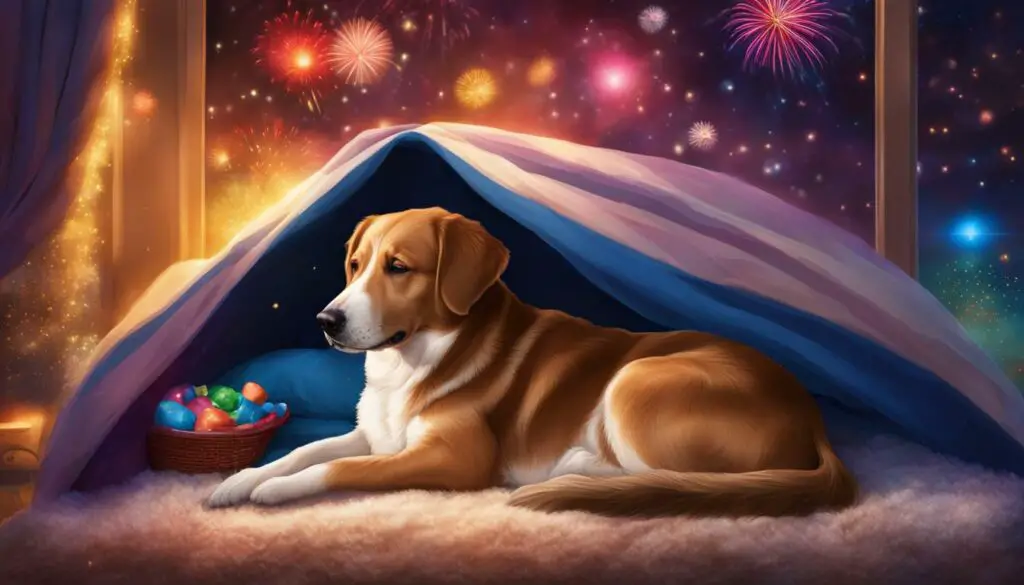
Ensuring a Safe Environment
Lastly, it’s important to ensure that your home and garden are escape-proof during the fireworks. Dogs can panic and may try to escape when they are frightened. Check all fences and gates to make sure they are secure, and consider keeping your dog on a leash or harness indoors to provide an extra layer of protection.
By following these steps and preparing your dog for fireworks, you can help minimize their anxiety and create a safe and comfortable environment for them during the festivities. Remember, each dog is unique, so it’s important to observe and understand your dog’s individual needs and adjust your approach accordingly. With a little preparation, you can help your dog feel secure and calm during fireworks celebrations.
Responding to Your Dog’s Anxiety During Fireworks
When it comes to comforting anxious dogs during fireworks, there are a few techniques you can try to help minimize their fear and provide them with some relief. First and foremost, it’s important to maintain a calm and reassuring demeanor yourself. Dogs are highly perceptive and can pick up on our emotions, so staying calm can help them feel more at ease. Avoid frantic behavior or excessive soothing gestures, as this can inadvertently reinforce their anxiety.
Physical comforting can also be helpful. Gentle petting and cuddling can provide a sense of security and reassurance to your dog. However, it’s important to note that not all dogs respond well to physical touch during times of stress, so be mindful of your dog’s individual preferences and body language. Some dogs may prefer to have their own space and may appreciate a quiet place to retreat to.
Distraction techniques can also be effective in minimizing fear during fireworks. Engaging in your dog’s favorite game or providing them with a puzzle toy can help divert their attention away from the loud noises and focus on a positive activity. Additionally, physical exercise or training exercises can help tire them out and release any pent-up energy, which may also help to reduce anxiety.
Quotes
“When my dog gets anxious during fireworks, I try to stay as calm as possible and provide him with a safe space to retreat to. I find that distracting him with a game of fetch or a puzzle toy really helps to take his mind off the loud noises. It’s all about finding what works best for your individual dog and being there to support them.”
Remember, every dog is unique, so it may take some trial and error to find the techniques that work best for your furry friend. If your dog’s anxiety during fireworks is severe or persists despite your efforts, don’t hesitate to reach out to a professional trainer or behavior consultant for additional guidance and support.
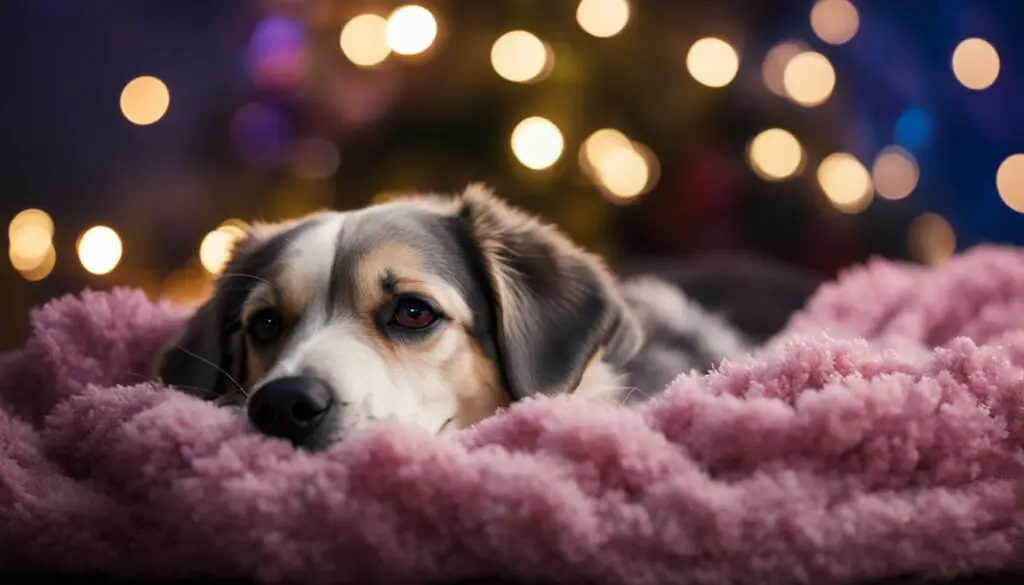
The Importance of Continued Support After Fireworks
Providing ongoing support for your dog after fireworks events is crucial for addressing their long-term anxiety and preparing them for future occasions. While the immediate fireworks may be over, many dogs can still experience lingering fear and stress. By acknowledging their anxiety and implementing strategies to help them cope, you can ensure your dog’s well-being and build their resilience.
One way to provide continued support is to engage in desensitization exercises with your dog. Gradually expose them to recorded sounds of fireworks in a controlled environment while providing positive reinforcement, such as treats or playtime. This process helps them associate the sounds with positive experiences, reducing their fear response over time. Consistency and patience are key, as each dog may respond differently to the training.
Additionally, maintaining a calm and reassuring environment is essential for your dog’s recovery. Avoid exposing them to loud noises or stressful situations, and create a safe space for them to retreat to if needed. Playing soothing music or white noise can help drown out any residual sounds from fireworks, providing a comforting atmosphere. Providing familiar toys, blankets, or other comforting items can also help alleviate their anxiety.
| Related Tips | Benefits |
|---|---|
| Engage in regular exercise with your dog | Reduces anxiety and promotes overall well-being |
| Consult with a professional trainer or behavior consultant | Obtain expert guidance tailored to your dog’s specific needs |
| Consider natural calming remedies | May help promote relaxation and reduce anxiety |
Remember, addressing your dog’s anxiety after fireworks events is an ongoing process. By providing continued support, engaging in desensitization exercises, and creating a comforting environment, you can help your dog overcome their fear and build their resilience for future fireworks events.
Preparing for future fireworks events is also important. Stay informed about upcoming fireworks displays in your area and take proactive measures to minimize their impact on your dog. Ensure that your dog’s identification is up to date in case of any unforeseen escape attempts. Consider using a microchip, which can greatly increase the chances of a lost dog being reunited with their owner. Plan ahead and create a safe space for your dog to retreat to during the fireworks, and keep them away from the sights and sounds as much as possible.
By understanding the ongoing needs of your dog and providing them with the necessary support and preparation, you can help them navigate future fireworks events with greater ease and confidence. Remember to be patient and consistent, and seek professional help if your dog’s anxiety persists or worsens over time. With your continued support, your dog can overcome their fear and enjoy a more peaceful and stress-free experience during fireworks celebrations.
Creating a Long-Term Solution: Desensitizing Your Dog to Loud Noises
If your dog experiences anxiety during fireworks or other loud noises, desensitization can be an effective long-term solution. Desensitization involves gradually exposing your dog to recorded sounds of fireworks and conditioning them to tolerate those sounds. This process helps your dog build resilience and reduce their fear and anxiety over time.
To begin desensitizing your dog, start by playing low-intensity firework sounds at a volume that doesn’t trigger anxiety. While the sound is playing, engage your dog in activities that they enjoy, such as playing with their favorite toy or offering them treats. This positive association helps your dog associate the sound of fireworks with something pleasant.
As your dog becomes more comfortable, gradually increase the volume of the firework sounds over multiple sessions. The goal is to expose your dog to increasingly realistic firework sounds while maintaining their relaxation and positive responses. It’s important to progress at a pace that is comfortable for your dog, ensuring that they don’t become overwhelmed.
| Desensitization Steps: | Desired Outcome: |
|---|---|
| Play low-intensity firework sounds | Associates sound with pleasant experiences |
| Gradually increase the volume of the sounds | Builds tolerance to louder noises |
| Expose to realistic firework sounds | Reduces fear and anxiety |
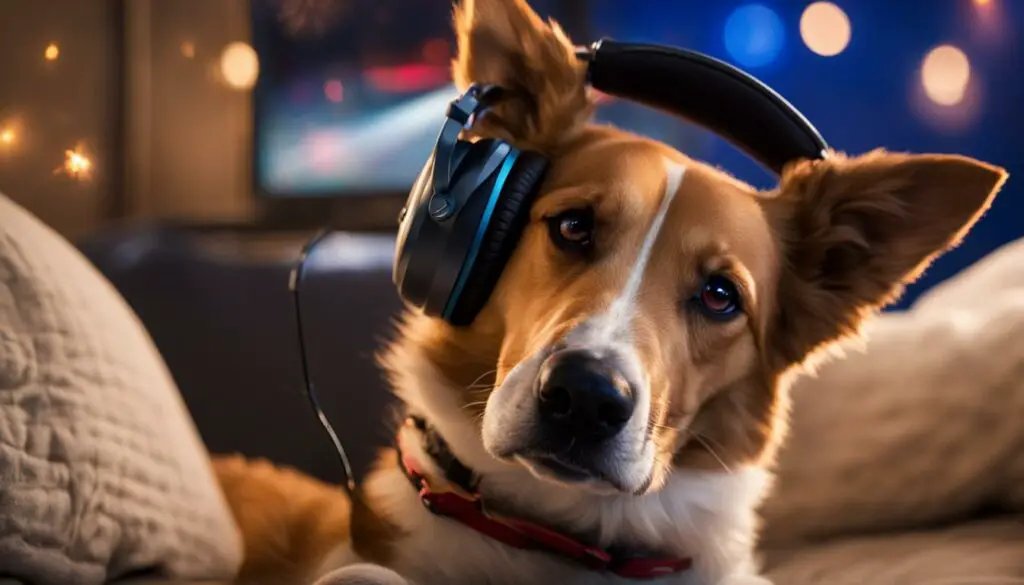
It’s important to be patient and consistent during the desensitization process. Each dog will respond differently, so it’s essential to tailor the program to your dog’s specific needs. Seeking guidance from a professional trainer or behavior consultant can provide you with expert support and help ensure the success of the desensitization program.
By desensitizing your dog to loud noises like fireworks, you can help them become more comfortable and reduce their anxiety. This long-term solution can provide your dog with a better quality of life, allowing them to navigate through fireworks celebrations and other noisy situations with greater ease.
Ensuring Your Dog’s Safety During Fireworks
When it comes to fireworks, the safety of your dog should be a top priority. These loud and unpredictable displays can be overwhelming for our furry friends, causing anxiety and distress. To keep your dog safe during fireworks, it’s important to take certain precautions and create a secure environment for them.
Minimizing Exposure
The first step in ensuring your dog’s safety is to keep them indoors during fireworks. The loud noises and bright lights can be frightening for dogs, so it’s best to create a calm and quiet space for them inside your home. Close all windows and curtains to minimize the impact of the sights and sounds of the fireworks. If possible, play soothing music or white noise to help mask the noise from outside.
Preventing Escapes
To prevent your dog from escaping during fireworks, make sure your home and garden are escape-proof. Secure all potential escape routes, such as gates, fences, and doors. Check for any gaps or holes in your fencing that your dog could squeeze through. It’s also important to ensure that your dog has proper identification, including a microchip and updated collar tags with your contact information. This will help increase the chances of a safe return if your dog does manage to escape.
Creating a Safe Haven
Creating a safe haven for your dog inside your home is essential. Choose a quiet room or area where your dog can retreat to and feel secure. Provide comfortable bedding and familiar toys to help them feel at ease. If your dog is crate trained, covering the crate with a blanket can help create a sense of security. It may also be beneficial to use pheromone products, such as sprays or diffusers, that promote relaxation and reduce stress in dogs.
Table: Tips for Keeping Your Dog Safe During Fireworks
| Tip | Description |
|---|---|
| Keep your dog indoors | Minimize their exposure to the sights and sounds of fireworks by keeping them inside your home. |
| Create a calm environment | Close windows and curtains, play soothing music or white noise to help mask the noise from outside. |
| Secure your home and garden | Ensure that all potential escape routes are secure and that your dog has proper identification. |
| Create a safe haven | Choose a quiet room or area in your home where your dog can retreat to and feel secure. |
By following these tips and taking the necessary precautions, you can help keep your dog safe and comfortable during fireworks. Remember, every dog is unique, so it’s important to assess their individual needs and provide the support and reassurance they require. If your dog’s anxiety persists or worsens, consulting with a veterinarian or professional dog trainer may be beneficial.
Seeking Professional Help for Severe Anxiety
Addressing severe anxiety in dogs during fireworks can be a challenging task. While there are various techniques that can help calm your dog, there may be instances where their anxiety is severe and requires professional intervention. Consulting with veterinarians who specialize in anxiety management can provide valuable insights and guidance on the best course of action for your dog.
Veterinarians can conduct a thorough assessment of your dog’s anxiety and recommend appropriate treatment options. In some cases, medication may be prescribed to help alleviate their anxiety and assist in creating a calmer state of mind. Veterinarians can also provide behavioral modification strategies and offer advice on how to create a supportive environment for your dog during fireworks.
Additionally, hiring trainers or behavior consultants who specialize in anxiety management can be beneficial. These professionals have the expertise to develop a customized behavior management plan tailored to your dog’s specific needs. They can guide you through desensitization exercises and provide ongoing support as you work towards helping your dog overcome their firework anxiety.
| Benefits of Seeking Professional Help | How Professionals Can Help |
|---|---|
| Comprehensive assessment of your dog’s anxiety | Developing a customized behavior management plan |
| Potential prescription of anxiety medication | Guidance on desensitization exercises |
| Expert advice on creating a supportive environment | Ongoing support and guidance |

“Seeking professional help for your dog’s severe anxiety can be a crucial step towards improving their overall well-being and quality of life. Veterinarians and trainers have the expertise to provide effective strategies and treatment options, helping your dog overcome their firework anxiety and build resilience.”
Remember that every dog is unique, and what works for one may not work for another. By seeking professional help, you can gain valuable insights and guidance tailored to your dog’s specific needs, ensuring that their severe anxiety is addressed in a comprehensive and compassionate manner.
Conclusion
In conclusion, helping your dog calm down during fireworks is essential for their comfort and safety. By implementing expert tips and techniques such as creating a safe haven, playing white noise, and desensitizing your dog to the sounds of fireworks, you can greatly alleviate their anxiety. It’s crucial to be patient and consistent in your approach, as each dog is unique and may respond differently to various methods.
Remember to consult with professionals if needed and continue providing ongoing support for your dog’s well-being during future fireworks events. By acknowledging and addressing your dog’s anxiety in a proactive manner, you can help them feel more secure and confident in the face of loud noises and fireworks.
By following these guidelines and prioritizing your dog’s comfort and safety, you can ensure that they have a peaceful and anxiety-free experience during fireworks celebrations.
FAQ
How can I calm my dog during fireworks?
To calm your dog during fireworks, experts recommend keeping them away from the fireworks, creating a safe haven for them, playing white noise, comforting them, and desensitizing them to the sounds. Consulting with a vet or trainer may be necessary for severe anxiety.
Why are dogs afraid of fireworks?
Dogs can be afraid of fireworks due to the loud noises, flashes of lights, and unpredictable nature of the displays. The fear can be psychological, causing anxiety and stress in dogs.
How can I recognize signs of fear in my dog during fireworks?
Dogs may exhibit physical cues of fear such as pinned back ears, shaking, growling, raised fur, and running away or seeking extra attention. Excessive panting, pacing, drooling, shallow breathing, and trembling can also indicate fear.
Do fireworks cause physical damage to dogs’ ears?
While dogs’ ears are more sensitive than human ears, the primary impact of fireworks on dogs is psychological rather than physical. The loud noises may startle dogs, but the emotional and psychological trauma can have a lasting impact on their well-being.
What steps can I take to calm my dog during fireworks?
You can keep your dog indoors, create a safe haven in a quiet space, play white noise or soothing music, comfort your dog, and desensitize them to the sounds of fireworks. Consulting with a vet or trainer may be necessary for severe anxiety.
Are there long-term solutions for helping my dog with firework anxiety?
Yes, desensitization techniques can help dogs overcome their firework anxiety. Gradually exposing them to recorded sounds of fireworks and pairing them with positive experiences can help them associate the sounds with something positive rather than fearful.
How can I prepare my dog for fireworks?
To prepare your dog for fireworks, take them for a long walk before dark, create a safe place for them to retreat to, keep curtains closed, distance them from the noise, and provide distractions such as puzzles or long-lasting chews.
What can I do to respond to my dog’s anxiety during fireworks?
It’s important to stay calm, provide physical comfort through gentle petting and cuddling, engage in favorite games or training exercises to distract your dog, and try different techniques to find what works best for them.
Is continued support necessary after fireworks are over?
Yes, it’s important to continue supporting your dog after fireworks to address their anxiety in a proactive manner. Implementing training techniques and desensitization exercises can help prepare them for future fireworks events.
Can desensitizing my dog to loud noises help in the long term?
Yes, desensitizing your dog to loud noises, including fireworks, can be an effective long-term solution. Gradually exposing them to recorded sounds and providing positive associations can help reduce their fear and anxiety over time.
How can I ensure my dog’s safety during fireworks?
Keep your dog indoors and away from the fireworks, ensure they have proper identification, create a safe environment inside your home, and make sure your home and garden are escape-proof to prevent accidents or escapes.
Should I seek professional help for my dog’s severe anxiety during fireworks?
If your dog’s anxiety is severe and other techniques have not been successful, it may be beneficial to seek professional help. Veterinarians can provide medication or therapeutic treatments, and trainers can develop a customized behavior management plan.

